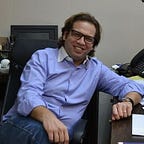Get diagnosed if you think you’ve got ADHD
Time is precious, and you deserve to know if ADHD is stealing it from you.
The longer you postpone getting diagnosed, the longer you’ll crave clarity.
I dealt with an undiagnosed ADHD condition until my daughter displayed the same signs: hyperactive, distracted, easily irritated, and unwilling to learn. She was just like me, at the age of five; the way I had been as a child, and still am, as an entrepreneur and father of four.
My mother robbed me of a truth that would eventually set me free: when I went for tests as a busy, “problematic” fourteen-year-old, the results showed I had ADHD — but she hid this from me, fearing it would be a setback.
The only setback was not knowing.
Undiagnosed ADHD is a persistent problem, as ADHD diagnoses increase worldwide (regardless of whether awareness of it has increased or not).
Recent reports show individuals with symptoms that haven’t sought a professional opinion are increasing too. This means many are continuing to live the way I was — unable to function to their potential, yet still battling a way through the world.
It’s taken long enough for ADHD to reach a state of global acceptance as a ‘serious’ condition. While the main symptoms were first observed in boys in 1902 by Sir George Frederick Still (and referred to in 1798 by Sir Alexander Chrichton), the first survey asking parents about ADHD was only in 1997. Despite more recognition, it’s still unnecessarily hard to see a doctor about ADHD, especially in the UK, where five-year waiting spans are leading people to self-medicate with illegal cannabis.
Over the decades, ADHD has been met with scepticism, with research on the subject marred by controversy. That’s not surprising; when something appears out of the ordinary, people naturally approach it with caution.
But because ADHD symptoms on their own are common, there’s also a reluctance to ‘medicalise’ normal fluctuating human behavior.
And I understand that — it’s easier to reject the idea that something is fundamentally wrong with yourself, or your child, at a neurochemical level, when all other signs are healthy.
But doing so shuts out the possibility of getting diagnosed, discovering the truth, and the potential to thrive. This doesn’t mean medication is the answer (though it is the first choice for ADHD treatment, and something I’m personally thankful for). Behavioral therapy is a strong option too.
But if you never get diagnosed, none of these options will be available — professionally — with the clear goal of helping you improve.
So, please: get professionally diagnosed. The sooner, the better.
